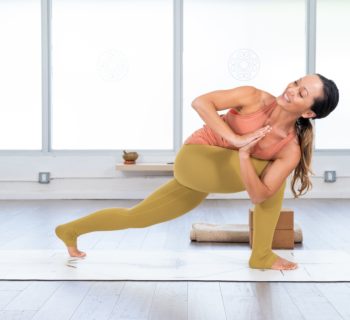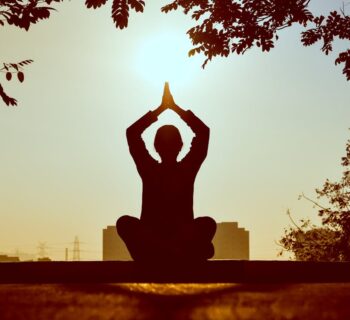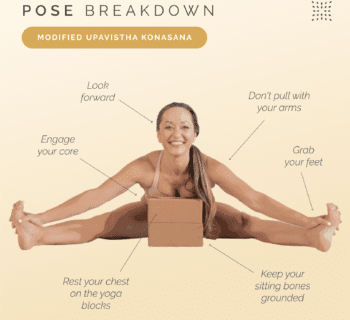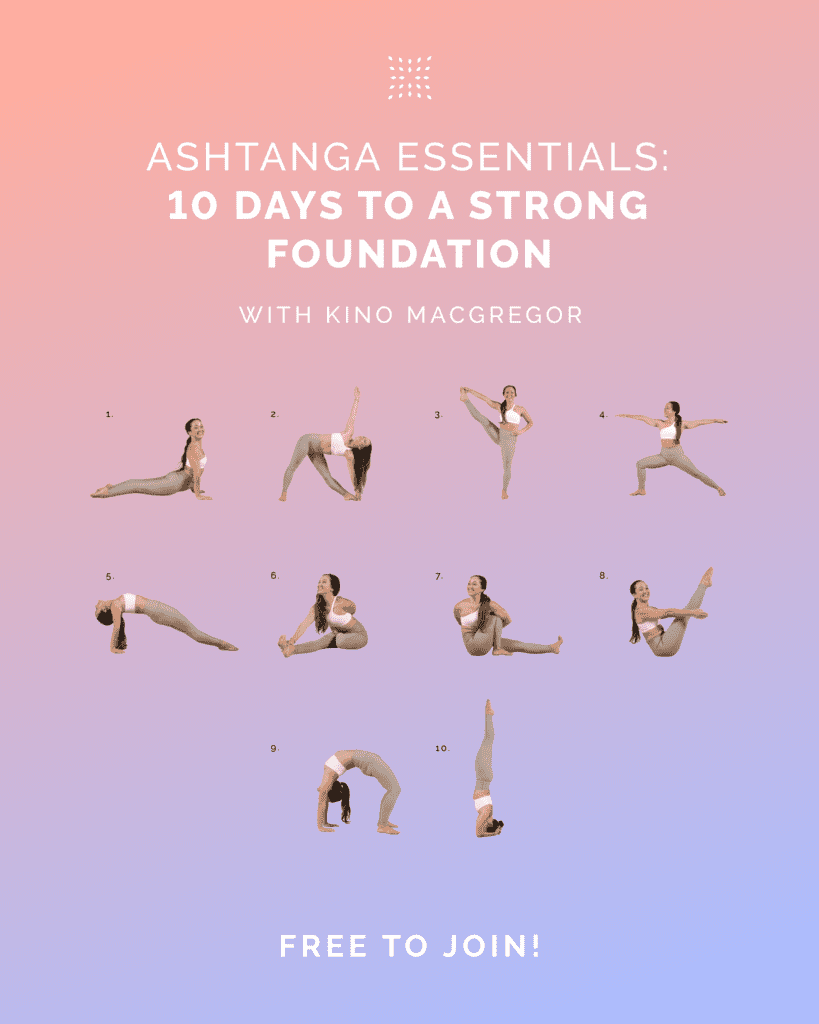Being an ally and accomplice to change begins with each individual person.
We firmly believe that intersectionality and wellness are complementary spheres in healing as well as supportive partners for both individual transformation and collective liberation. Together, we can take accountability, see and hear one another in new ways, unify our efforts and create new possibilities and pathways forward.
As we stated in our last article in this ongoing series, “Intersectionality is the path forward and the future of wellness so we can be more inclusive of all marginalized voices and experiences. Intersectionality allows us to examine the truth in a holistic way without giving in to denial, a distortion of reality, or leaning out of the conversation due to guilt or shame. Intersectionality, like our lived yoga practices, allows us to step out of perceived and socially constructed binaries and hold the full spectrum of experience, range of emotions and move into conscious action to create social change. This is yoga in action.”
We also firmly believe that excavating and understanding our own experiences through this lens and sharing our stories of our awakening, healing, and evolution offers others the opportunity to do the same. Not only does this process offer a catalyst for ourselves by offering us to reclaim and proclaim our voices, but we also allow opportunities for others to connect from their hearts and create new bridges of understanding and, hopefully, sparks of inspiration, courage, and strength.
With that intention, we humbly offer snippets of our personal stories and what intersectionality and wellness have offered us on our individual paths, and how these two spheres continue to offer inroads toward the horizon line.
Melanie’s Story @melmelklein
I’ve said it many times, and I’ll say it again, intersectional feminism helped me understand, deconstruct and reframe the world around me as a young woman. My yoga and embodiment practices allowed me to reframe my relationship with myself and how I interacted with and showed up in that world around me. To me, these two spheres overlapped organically, and both spokes originated from a hub centered on raising consciousness and taking action.
As intersectional feminism espouses, feminism is not just about but for womxn in all their diversity. Feminism is a praxis. We do our feminism. We live our feminism. Similarly, as I fully immersed myself into my embodiment and mindfulness practices, it immediately became clear that this wasn’t about the time I spent on the mat or the cushion, but how I applied these teachings and practices to how I was living moment to moment.
Together, feminism and yoga have utterly transformed and supported me over the last 27 years. They are the two primary variables responsible for my growth, empowerment, and sense of agency. While my personal understanding of the systems and structures of oppression, as well as my individual (and continued) liberation, is an important outcome of that equation, my ability to see my place in the world and in a larger spectrum of experience among womxn is even more important.
While my experiences and challenges have been and are real… my experiences, my challenges, and my truth isn’t the only truth that exists. There’s a larger interwoven social fabric that exists composed of countless realities, narratives, struggles, and triumphs. Being introduced to intersectional feminism as a young woman versus being welcomed into a version of feminism that only centered my experiences as a cisgender white woman allowed me to heal and empower myself while offering me the opportunity to identify my position within a larger spectrum of power and privilege. This has been vital in my personal growth as well as my continued growth and evolution as an ally, advocate, and agent for social justice, equity, accessibility, and representation for everyone and every body.
Too often, I’ve seen both feminism and wellness rejected because they have not represented or been accessible to various marginalized groups. And I’ve seen proponents of both feminism and wellness communities get in their feelings when critical questions have been raised and calls to action have been taken to change them. When we’re deeply committed to either, it behooves us to pause and listen deeply. It’s vital for us to truly reconnect to the core teachings of each practice/praxis and live from these truths.
This is what feminism and yoga have offered me and what has fed and fueled my personal and professional work. My work, my commitment and who I am and how I show up continues to grow and evolve. Feminism and yoga continue to shore up the foundation for that growth, and I firmly believe in their ability to help co-create a world in which we connect heart-to-heart authentically and deeply without the spiritual bypassing and marginalization that is rampant as well as create deep, meaningful and sustainable social change. This is my hope and my offering.
Anusha’s Story @shantiwithin
You would never know the real meaning of yoga given the spiritual bypassing and co-opting of this ancient spiritual Indian practice in the west. Search #yoga on Instagram, and your feed will be filled with white, thin, heteronormative able-bodied women in scantily clad clothes focused on the acrobatics of yoga and an over sexualization of the practice. Let’s be clear, this is the antithesis of yoga. For myself, someone who was born and raised in the philosophy of yoga and Sanatana Dharma, more commonly known as Hinduism, it’s particularly jarring to see how far we have come from the true essence of the practice, which is unity and freedom from suffering for all.
As the daughter of Sri Lankan Tamil immigrants, my ancestors had to resist 443 years of colonial rule in Sri Lanka under three different colonial powers to hold onto our indigenous faith. Their courage and resistance is something I never take for granted. However, having to now fight against the continued colonisation and commoditization of yoga in the west is deeply saddening and problematic.
My faith is not here to be misappropriated and desecrated by the modern yoga practitioner. Let’s be aware that cultural appropriation is a form of racism. Unless BIWOC are represented in wellness, we will continue to have our voices silenced by the mainstream. Modern feminism and intersectionality must include BIWOC at more than just a surface level and must include greater representation of womxn of color in general of all races, abilities, classes, and sexual orientations. At school, we were never taught the brutal history of colonization or slavery. The constant whitewashing of history is a problem and must be dismantled. This is what allows racism and white supremacy to thrive and flourish. We can’t have unity without accountability and repair. A big part of this process is enabling BIPOC to write our own stories and rewrite the narrative with the truth. When a white man tops the 100 books on Hinduism, we have a problem.
Real change is required to move beyond tokenism to sustainable activism, and representation is a pivotal part of this change. It is one reason why the word Feminist never resonated with me as I never saw myself or people who looked like me included in this framework. The whiteness of wellness must be unpacked so we can work towards creating a system where we can all be seen, heard, and well. There is nothing wrong with having privilege, it is what we do with our privilege that counts. The first step is acknowledging the privilege we have and then take steps in order to utilize this as agents of change in our communities and wider society. This is yoga in action.
The toxic spiritual bypassing in Yoga is how we became anti-science but not anti-racist. Unity can only come through accountability and recognition of white supremacy by the majority i.e. white folks. White silence or gas lighting simply causes more harm. Denial and blame shifting is not a solution. We have seen far too much of this in the wellness space. Take this opportunity to take the onus and responsibility of dismantling this unjust system that you benefit from that has kept BlPOC oppressed and marginalised for centuries. This is the first step towards reconciliation. This is intersectionality in action and being an accomplice to change that is long overdue.
Conclusion
In conclusion, we want to invite you all to think about some ways in which you can create sustainable ways of impacting change in your communities by amplifying marginalized voices. Being an ally and accomplice to change begins with each individual person. A great first step in supporting the work of BIPOC and QTBIPOC is buying their books, signing up for their workshops and trainings. Platforming and profiling folks by sharing their work on your social media. Economic empowerment is a key aspect of intersectionality. For additional resources, please visit @wocandwellness and @ybicoalition on Instagram.
NOTE: This post is part of a collaborative media series organized and curated by Omstars in collaboration with the Yoga & Body Image Coalition and WOC + Wellness intended as an honest, thoughtful, and holistic exploration of intersectionality, wellness, and sustainable action with the intention of creating sustainable social change.
Meet the authors: Anusha Wijeyakumar and Melanie Klein
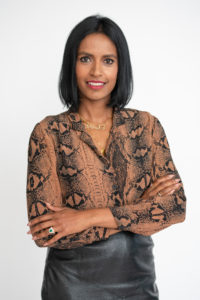
Anusha Wijeyakumar is the daughter of Sri Lankan immigrant parents. Being raised in the philosophy of Sanatana Dharma and a lifelong student of Hinduism and Buddhism, she has a vast knowledge in both. Anusha is also knowledgeable in the areas of meditation, pranayama, mantra, and the philosophy associated with yoga. Anusha is very passionate about honouring the roots of yoga and educating people on the importance of decolonizing these practices. Anusha is a sought after motivational speaker around the world on the science of mindfulness and meditation. Anusha is also the Wellness Consultant for Hoag Hospital in Orange County, CA where she is actively engaged on championing mindfulness and meditation practices for maternal mental health programs, early risk assessment for breast & ovarian cancer prevention programs and breast cancer survivorship programs. Anusha is one of the first people to create a meditation program to be used in clinical research at Hoag Hospital. Anusha has over 15 years of international senior management experience working for Fortune 50, 100, and 500 global corporations, charitable organizations & private companies in three continents. Womxn’s health and social justice is at the heart of all that Anusha is involved with. Anusha is on the Board of Directors for the non-profit MOMS Orange County and is very engaged in working with inner city communities to bring the power of yoga for a healthy mind, body and spirit into these localities to nurture and empower change from within. Anusha recently co-founded the movement Womxn of Color + Wellness @wocandwellness which is focused on decolonizing wellness and making yoga and wellness more equitable, accessible, diverse and inclusive. Anusha’s first book Meditation With Intention: Quick & Easy Ways to Create Lasting Peace will be released in January 2021 by Llewellyn Worldwide.
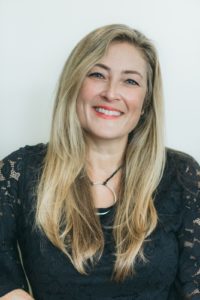
Melanie Klein, M.A., is an empowerment coach, thought leader and influencer in the areas of body confidence, authentic empowerment, and visibility. She is also a successful writer, speaker, and professor of Sociology and Women’s Studies. Her areas of interest and specialty include media literacy education, body image, and the intersectional analysis of systems of power and privilege. She is the co-editor of Yoga and Body Image: 25 Personal Stories About Beauty, Bravery + Loving Your Body (Llewellyn, 2014) with Anna Guest-Jelley, a contributor in 21st Century Yoga: Culture, Politics and Practice (Horton & Harvey, 2012), is featured in Conversations with Modern Yogis (Shroff, 2014), a featured writer in Llewellyn’s Complete Book of Mindful Living (Llewellyn, 2016), co-editor of Yoga, the Body and Embodied Social Change: An Intersectional Feminist Analysis with Dr. Beth Berila and Dr. Chelsea Jackson Roberts (Rowman and Littlefield, 2016) as well as the editor of the new anthology, Yoga Rising: 30 Empowering Stories from Yoga Renegades for Every Body. She co-founded the Yoga and Body Image Coalition in 2014 and is the co-founder of The Joy Revolution. She has been practicing yoga and meditation since 1996 and currently lives in Santa Monica, CA.
Connect: melaniecklein.com, ybicoalition.com, yogaandbodyimage.org, yogarisingbook.com
Photo by Gemma Chua-Tran on Unsplash






